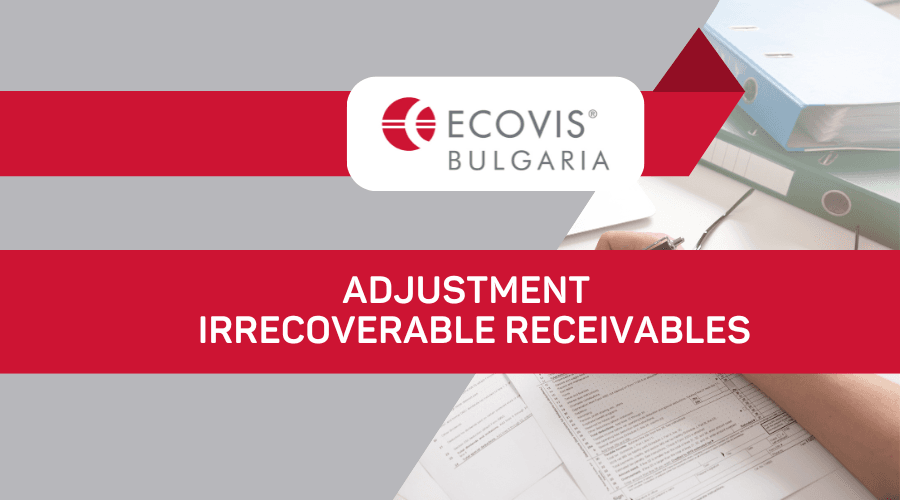
Adjustment of tax charged on irrecoverable receivables
Ecovis | 7 August 2024
The Bulgarian tax system, like many others, recognises the complexity of business operations. For a company there is always a risk that receivables may become uncollectible. In order to mitigate the impact of these losses on the company's tax liability, Bulgarian tax legislation allows for adjustments to tax assessments.
This article from Ecovis Bulgaria will discuss the specific provisions governing the tax charge for uncollectible receivables in Bulgaria. We will explore the conditions under which this adjustment is permissible, the documentation required and the potential implications for business. Through these guidelines, companies can effectively manage their tax liabilities while considering the challenges of uncollectible accounts.
Conditions for reduction of the tax base and accrued tax
The supplier may reduce the tax base and the tax charged on a taxable supply under the following conditions:
- An invoice has been issued for the supply and the GST has been charged against it.
- The recipient and the supplier are not related parties at the time of the supply or at the time of the relevant circumstance.
- No transfer for consideration (assignment) has taken place.
- The supplier has taken collection action.
- The supplier has notified the recipient in writing that it considers the claim to be uncollectible and has evidence of the notification sent.

When is a claim considered irrecoverable?
In Bulgaria, under the VAT Act, we consider a receivable as uncollectible under several conditions:
- Expiry of 3 or 5 years from the moment the receivable became due.
- A final court decision has ruled that the receivable is not due.
- The claim is barred by statute.
- The claim remained uncollected after the enforcement proceedings were concluded.
- Insolvency proceedings have been terminated by a confirmed reorganisation plan.
- Expiry of 365 days for a receivable up to BGN 600 from the moment when the receivable became due.
- The debtor is deleted after bankruptcy or liquidation proceedings have been completed.
Procedure for reducing the tax base and the tax charged
Where the customer is a person registered under the VAT Act
The supplier shall issue a credit note up to the amount of the non-payment if the recipient was a registered person at the time of supply and the conditions are met.
What should the credit note contain?
- The reason for the uncollectible claim and the date on which it occurred.
- The taxable amount and the tax charged on the irrecoverable supply.
- Date and amount of partial payments received or amounts repaid, if any.
Where the customer is a person not registered under the VAT Act
The supplier shall issue a report in accordance with the procedure set out in the VAT Act Regulations within three months from the expiry of the tax period during which the relevant circumstance occurred.

The report must contain:
- Number and date of the protocol.
- Name and identification number of the issuer and the recipient.
- The reason for the uncollectible claim and the date it occurred.
- Invoice number and date of the uncollectible delivery.
- The taxable amount and tax on the supply.
- Tax credit used for related supplies.
- Difference between supply tax and tax credit availed.
- Date and amount of partial payments, if any.
- Amount of the unpaid portion and the corresponding tax.
- The reduction of the tax charged.
Other cases
If the debtor is deleted after insolvency or liquidation, the supplier shall issue a report in accordance with the above procedure. The reduction of the tax charged shall be determined as the difference between the tax charged on the supply and the tax credit availed.

Increase in tax charged on receipt of payment
In the event that a previously written-off debt is recovered, the tax charged must be adjusted. Bulgarian tax law requires the company to increase its tax charge for the amount refunded.
This adjustment serves to correct the original tax reduction and ensure accurate tax reporting. Timely and correct application of this provision is critical to avoid potential penalties and interest.
In case of full or partial payment of the invoice after adjustment of the tax credit
The supplier must issue a debit note on receipt of full or partial payment for a supply in respect of which the taxable amount and tax have been reduced by a credit note.
The supplier must issue a debit note on receipt of full or partial payment for a supply for which the taxable amount and the tax have been reduced by a debit note.
The debit note must contain:
- Date and amount of payment received.
- The tax base and tax contained in the payment received.
- Date and number of the credit note issued reducing the tax.

The protocol must contain:
- Protocol number and date.
- Name and identification number of the issuer and recipient.
- Number and date of tax reduction protocol issued.
- Date and amount of payment received.
- The proportion of tax contained in the payment received.
- Increase in tax charged.
Notification of the NRA
The supplier shall notify the NRA in writing within three months for an uncollectible receivable under a taxable supply with a tax base exceeding BGN 100 000.
For supplies with a taxable amount up to BGN 100 000, no notification shall be submitted, but the supplier shall issue a credit note and submit a declaration and accounting registers in the appropriate order.
Restrictions on reduction of the tax base and tax
No reduction shall be made where the supplier knew or ought to have known that he would not receive the amount due under the supply. This is accepted in cases of apparent supply, circumvention of the law or where the price differs significantly from the market price.
Declaration and reporting
- Credit note: shall be indicated in the accounting records with code "23".
- Tax reduction note: shall be indicated in the sales register with code "29", the tax reduction being indicated with a sign (-).
- Debit note: shall be reflected in the general order.
- Tax Increase Note: shall be indicated in the sales ledger with code "29", the tax increase shall be indicated with a (+) sign.
You can find more useful information in our blog.
 Make an inquiry
Make an inquiry